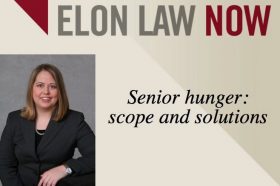In this week’s “Elon Law Now” series, Elon Law Professor Hannah Vaughan, director of the school’s Elder Law Clinic, comments on food insecurity among senior citizens in Guilford County.

“In a report released this April titled ‘How Hungry is America?’ the Food Research and Action Center indicated that the Greensboro/High Point Metropolitan area has the highest rate of food hardship anywhere in the country and is the only Metropolitan area where more than 25 percent of residents indicate that they do not have sufficient funds to purchase food.
“These statistics are alarming and while we should be concerned about every single person suffering this hardship, I am particularly concerned for our senior citizens. Research has shown that food insecure seniors are more likely to have lower nutrient intakes than older adults who are food secure and are at higher risk for severe health consequences than younger people who experience food insecurity.
“’The State of Senior Hunger in America 2013: An Annual Report’ also released in April, ranks North Carolina in the top 10 states for the number of seniors (60 and older) who are food insecure. It estimates that in 2013 over 18 percent of seniors in North Carolina experienced the threat of hunger. Those at greatest risk for food insecurity among seniors are the poor and near-poor, people of color, the unemployed, the disabled, and those residing in the South or Southwest. Among age categories of seniors, the people at highest risk are the ‘youngest old’ (defined as age 60-69).
“There are federal benefits available to alleviate hunger for those who qualify. The Supplemental Nutrition Assistance Program (SNAP), formerly known as Food Stamps, provides a limited benefit to low-income seniors. However, only about 1/3 of seniors who are eligible for SNAP benefits actually receive them.
“It saddens me to know that so many seniors in my community are experiencing food insecurity. I would encourage anyone who is struggling with food insecurity to make an application for SNAP benefits. Because hunger is such a pervasive problem in our community, we need to do a better job making sure our seniors are aware of the benefits available to them.
“Although SNAP provides some relief, not everyone who experiences food insecurity will qualify. Statistics show that approximately 40 percent of seniors in Guilford County who experience food insecurity have incomes above the poverty level, which excludes them from receiving federal benefits. Even for those who do qualify for SNAP, the benefits are limited – in some cases, the benefit is as low as $16 per month. Local food banks and other non-profit organizations like Food Assistance, Inc. and Mobile Meals try to fill the gap for seniors, but the needs are great and the waiting lists for services can be several weeks or months. Even one day is too long when you are hungry.
“Elon’s Elder Law Clinic can provide representation in matters related to SNAP (formerly known as Food Stamp) Benefit Eligibility for individuals who qualify for our free legal services. The Clinic serves low-income residents of Guilford County who are 60 or older with civil legal matters including public benefit eligibility, long term care planning, advanced health care directives, estate planning, consumer protection, and some family law matters.”
More information on the reports and organizations referenced above:
The Food Research and Action Center report “How Hungyry is America?” (April 2015)
Elon Law Professor Hannah Vaughan


